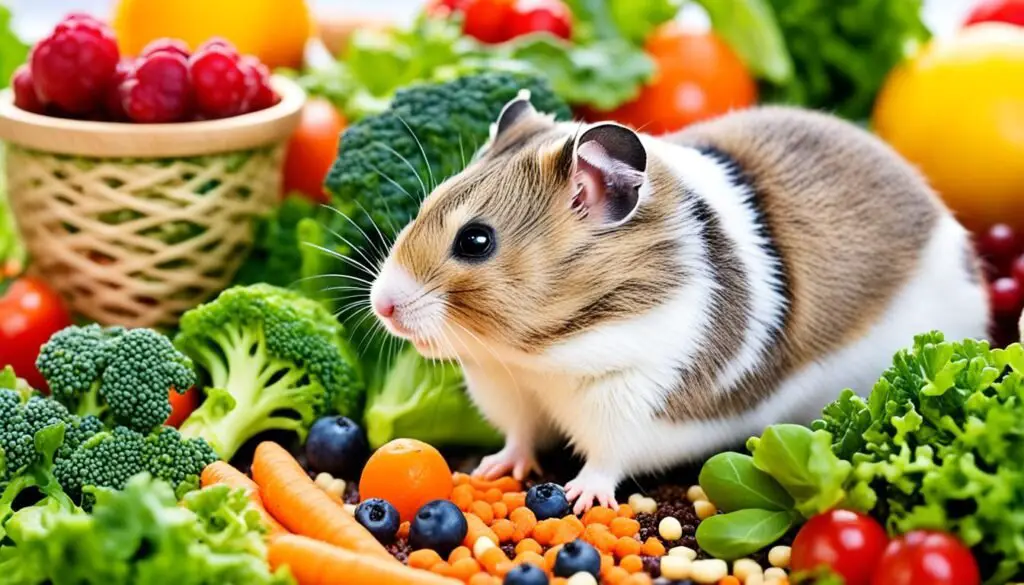Did you know that hamsters don’t have a specific favorite food? While these small, nocturnal pets have their preferences, they don’t have a single go-to favorite. But don’t worry, we’ve got you covered with the top food choices and ideal diet for hamsters! So, if you’re wondering what your furry friend would love to munch on, keep reading to discover some surprising and delicious options to keep your hamster happy and healthy.
Types of Hamster Food
When it comes to hamster food, you have a variety of options to choose from. One popular choice is commercial hamster food mixes, which are specially formulated to meet your hamster’s nutritional needs. These mixes typically include a combination of seeds, grains, and pellets, providing a balanced diet for your furry friend.
Fresh fruits and vegetables can also be given to your hamster as treats. However, it’s important to offer these in moderation to avoid any digestive issues. Hamsters enjoy the occasional protein-rich foods as well, such as cooked chicken or scrambled eggs, which can provide some variety in their diet.
Hay and Pellets
Hay and pellets are essential components of a hamster’s preferred diet. High-quality hay, such as timothy hay, provides hamsters with the necessary fiber to aid in digestion. It also helps wear down their constantly growing teeth. Pellets, on the other hand, offer a balanced mix of nutrients that contribute to a hamster’s overall health.
When choosing hay and pellets for your hamster, opt for ones specifically made for hamsters. This ensures that they receive the ideal diet for their needs. Good quality hay and pellets can be found at pet stores or online retailers that specialize in small animal supplies.
Fresh Fruits and Vegetables
Adding fresh fruits and vegetables to your hamster’s diet can provide them with extra vitamins and minerals, contributing to their ideal diet for optimal health. Some top food choices for hamsters include small pieces of apple, carrot, cucumber, and spinach. These options offer a variety of flavors and textures that your hamster is likely to enjoy.
When introducing fresh fruits and vegetables, it’s essential to do so gradually, starting with small amounts. This helps prevent any potential upset stomachs and allows your hamster’s digestive system to adjust to the new foods. Remember to remove any uneaten fresh food from the cage to prevent spoilage.
Adding Variety and Nutrients
By diversifying your hamster’s diet with fresh fruits and vegetables, you provide them with a wider range of nutrients. For example, apples contain essential vitamins and fiber, carrots offer beneficial beta-carotene, cucumbers provide hydration, and spinach is rich in iron.
Keep in mind that while fresh fruits and vegetables are a valuable addition to their diet, they should not make up the majority of their meals. Balance is key to ensure your hamster receives a well-rounded and nutritious diet.
Proteins for Hamsters
While hamsters are mainly herbivores, they can benefit from occasional protein-rich foods as part of their ideal diet. Incorporating these foods into their meal plan supports their overall health. It’s important to provide a balanced mix of nutrients for your furry friend. Here are some delicious protein options that hamsters enjoy:
Cooked Chicken
Cooked chicken is a great source of protein for hamsters. It can be given as an occasional treat. Make sure the chicken is thoroughly cooked and boneless. You can shred a small piece of cooked chicken and offer it to your hamster. Remember to remove any uneaten food to maintain cleanliness in their habitat.
Scrambled Eggs
Scrambled eggs are another protein-rich option for your hamster. They provide essential nutrients and can be served as a treat. Cook the eggs without any seasoning or added ingredients. Offer a small portion of scrambled eggs to your hamster, and observe their response. If they enjoy it, you can include it as part of their occasional variety.
Mealworms
Mealworms are a popular source of protein for hamsters. They are readily available at pet stores and serve as a wholesome treat. Offer a few mealworms to your hamster, either as they are or lightly cooked. Remember to provide fresh, clean water along with the mealworms to keep your hamster hydrated.
Including these protein options in your hamster’s diet ensures they receive a variety of nutrients. Remember to offer proteins as occasional treats and maintain a balanced feeding routine. Combine these protein-rich foods with other essential components to create an ideal diet for your beloved hamster.
Avoid These Foods
Although hamsters have a varied diet, it’s important to be aware of certain foods that they should avoid. These foods can be toxic to hamsters or cause digestive issues. Here are some foods you should steer clear of:
- Chocolate: Chocolate contains theobromine, which is toxic to hamsters and can cause serious health problems.
- Caffeine: Just like in humans, caffeine can be harmful to hamsters and should be avoided.
- Alcohol: Alcohol is extremely dangerous for hamsters and should never be given to them.
- Sugary and salty foods: These can disrupt a hamster’s delicate digestive system and lead to health issues.
- Onions and garlic: These foods can cause digestive upset and even damage a hamster’s red blood cells.
- Citrus fruits: Citrus fruits are too acidic for hamsters and can cause stomach discomfort.
When it comes to your hamster’s diet, it’s crucial to research and be aware of any potential harmful foods. By avoiding these foods and providing a balanced diet of hamster’s preferred choices, you can keep your furry friend happy and healthy.
Feeding Tips for Hamsters
To ensure your hamster’s well-being, it’s important to follow some feeding tips. Providing the ideal diet for hamsters is essential for their overall health and happiness. Here are some top food choices and tips to keep in mind:
1. Fresh Food and Water
Offer your hamster fresh food and clean water daily. Replace any uneaten food to maintain cleanliness and prevent spoilage. Fresh food ensures that your hamster receives the necessary nutrients for a balanced diet.
2. Monitor Weight and Adjust Portions
Monitor your hamster’s weight regularly and adjust the portion sizes accordingly. Just like humans, hamsters need to maintain a healthy weight. If your hamster is gaining or losing weight, consult a veterinarian for guidance on adjusting their diet.
3. Variety is Key
Offer a variety of foods to keep your hamster’s diet interesting and ensure they receive a wide range of nutrients. This will also prevent them from getting bored with their food and encourage them to eat a well-rounded diet.

Conclusion: Happy and Healthy Hamsters
While hamsters may not have a specific favorite food, they do have certain preferences when it comes to their diet. To keep your hamster happy and healthy, it’s important to provide them with an ideal diet that includes a balanced mix of commercial hamster food, fresh fruits and vegetables, and occasional protein-rich treats.
For their main source of nutrition, opt for high-quality commercial hamster food mixes. These mixes are specially formulated to meet the nutritional needs of hamsters and provide a variety of seeds, grains, and pellets. Additionally, fresh fruits and vegetables can be given as treats to provide extra vitamins and minerals. Just remember to introduce these foods gradually and remove any uneaten fresh food to prevent spoilage.
Occasional protein-rich treats like cooked chicken, scrambled eggs, or mealworms can also be offered to your hamster. However, it’s important to provide these treats sparingly, as excessive protein intake can lead to health issues. Always ensure your hamster has access to fresh, clean water for proper hydration.
To maintain the well-being of your furry friend, it’s crucial to avoid harmful foods like chocolate, caffeine, alcohol, sugary and salty foods, onions, garlic, and citrus fruits. These foods can be toxic or cause digestive issues for hamsters.
By following these feeding guidelines and providing your hamster with a balanced and varied diet, you can ensure they stay happy and healthy for years to come.
